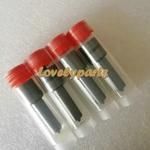Information injection-pump assembly
BOSCH
F 019 Z10 804
f019z10804
ZEXEL
101401-4250
1014014250
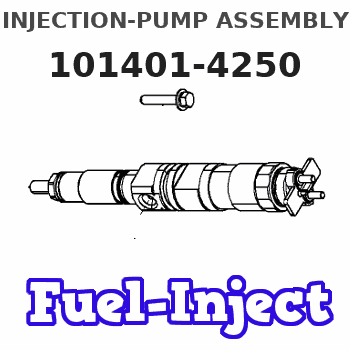
Rating:
Service parts 101401-4250 INJECTION-PUMP ASSEMBLY:
1.
_
6.
COUPLING PLATE
7.
COUPLING PLATE
8.
_
9.
_
11.
Nozzle and Holder
8-97114-015-0
12.
Open Pre:MPa(Kqf/cm2)
18.1(185)
15.
NOZZLE SET
Cross reference number
BOSCH
F 019 Z10 804
f019z10804
ZEXEL
101401-4250
1014014250
Zexel num
Bosch num
Firm num
Name
Calibration Data:
Adjustment conditions
Test oil
1404 Test oil ISO4113 or {SAEJ967d}
1404 Test oil ISO4113 or {SAEJ967d}
Test oil temperature
degC
40
40
45
Nozzle and nozzle holder
105780-8140
Bosch type code
EF8511/9A
Nozzle
105780-0000
Bosch type code
DN12SD12T
Nozzle holder
105780-2080
Bosch type code
EF8511/9
Opening pressure
MPa
17.2
Opening pressure
kgf/cm2
175
Injection pipe
Outer diameter - inner diameter - length (mm) mm 6-2-600
Outer diameter - inner diameter - length (mm) mm 6-2-600
Overflow valve
131424-4920
Overflow valve opening pressure
kPa
127
107
147
Overflow valve opening pressure
kgf/cm2
1.3
1.1
1.5
Tester oil delivery pressure
kPa
157
157
157
Tester oil delivery pressure
kgf/cm2
1.6
1.6
1.6
Direction of rotation (viewed from drive side)
Left L
Left L
Injection timing adjustment
Direction of rotation (viewed from drive side)
Left L
Left L
Injection order
1-3-4-2
Pre-stroke
mm
3.9
3.85
3.95
Rack position
Point A R=A
Point A R=A
Beginning of injection position
Governor side NO.1
Governor side NO.1
Difference between angles 1
Cal 1-3 deg. 90 89.5 90.5
Cal 1-3 deg. 90 89.5 90.5
Difference between angles 2
Cal 1-4 deg. 180 179.5 180.5
Cal 1-4 deg. 180 179.5 180.5
Difference between angles 3
Cyl.1-2 deg. 270 269.5 270.5
Cyl.1-2 deg. 270 269.5 270.5
Injection quantity adjustment
Adjusting point
-
Rack position
12.2
Pump speed
r/min
960
960
960
Average injection quantity
mm3/st.
58.1
56.5
59.7
Max. variation between cylinders
%
0
-2.5
2.5
Basic
*
Fixing the rack
*
Standard for adjustment of the maximum variation between cylinders
*
Injection quantity adjustment_02
Adjusting point
H
Rack position
9.5+-0.5
Pump speed
r/min
285
285
285
Average injection quantity
mm3/st.
8.4
7.1
9.7
Max. variation between cylinders
%
0
-10
10
Fixing the rack
*
Standard for adjustment of the maximum variation between cylinders
*
Injection quantity adjustment_03
Adjusting point
A
Rack position
R1(12.2)
Pump speed
r/min
960
960
960
Average injection quantity
mm3/st.
58.1
57.1
59.1
Basic
*
Fixing the lever
*
Injection quantity adjustment_04
Adjusting point
B
Rack position
R1+0.5
Pump speed
r/min
1600
1600
1600
Average injection quantity
mm3/st.
78.7
74.7
82.7
Fixing the lever
*
Injection quantity adjustment_05
Adjusting point
I
Rack position
-
Pump speed
r/min
150
150
150
Average injection quantity
mm3/st.
78
78
110
Fixing the lever
*
Timer adjustment
Pump speed
r/min
-
Advance angle
deg.
0
0
0
Remarks
Measure speed (beginning of operation).
Measure speed (beginning of operation).
Timer adjustment_02
Pump speed
r/min
-
Advance angle
deg.
5
4.5
5.5
Remarks
Measure the actual speed, stop
Measure the actual speed, stop
Test data Ex:
Governor adjustment
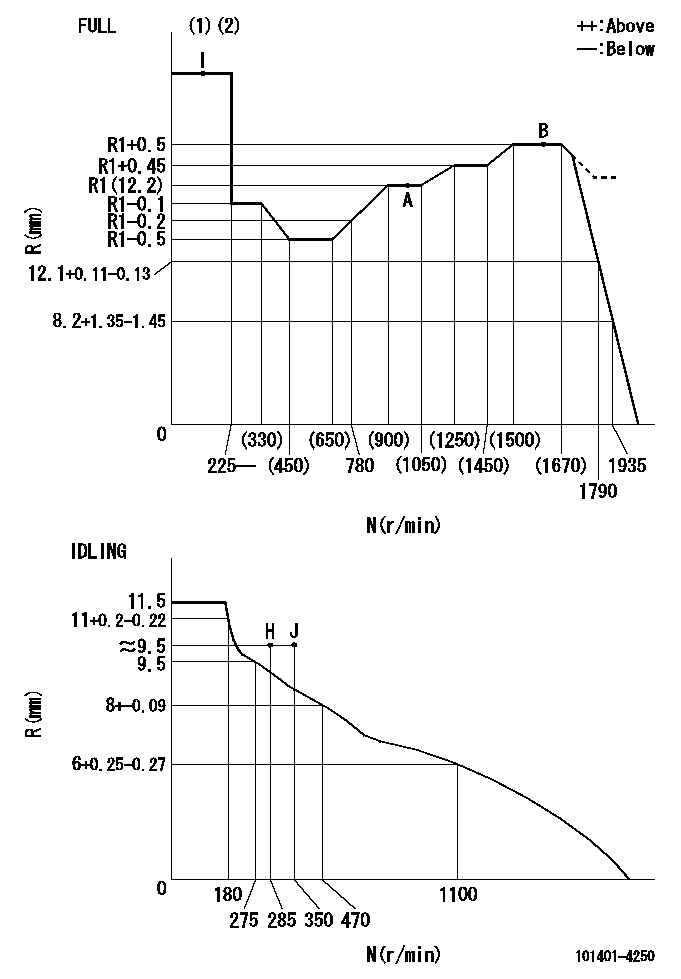
N:Pump speed
R:Rack position (mm)
(1)Torque cam stamping: T1
(2)Tolerance for racks not indicated: +-0.05mm.
----------
T1=F56
----------
----------
T1=F56
----------
Speed control lever angle
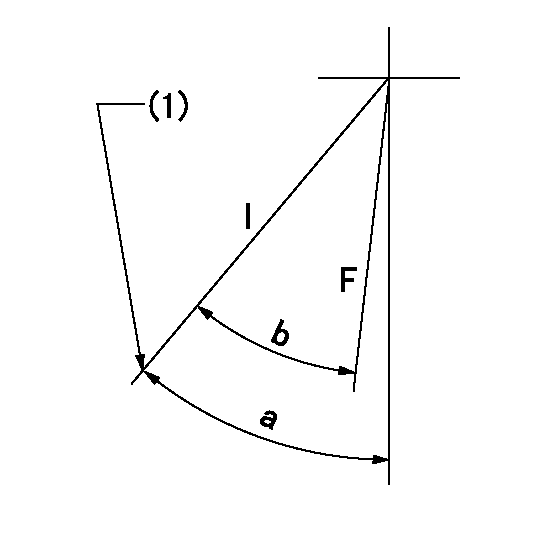
F:Full speed
I:Idle
(1)Stopper bolt setting
----------
----------
a=43deg+-5deg b=37deg+-3deg
----------
----------
a=43deg+-5deg b=37deg+-3deg
Stop lever angle
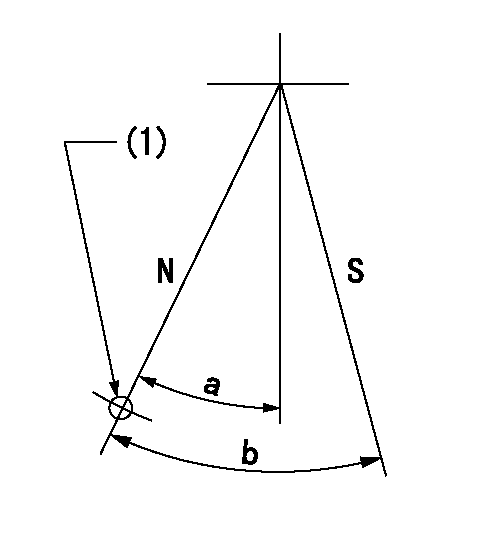
N:Pump normal
S:Stop the pump.
(1)Use the hole at R = aa
----------
aa=64mm
----------
a=20deg+-5deg b=29deg+-5deg
----------
aa=64mm
----------
a=20deg+-5deg b=29deg+-5deg
0000001501 FICD
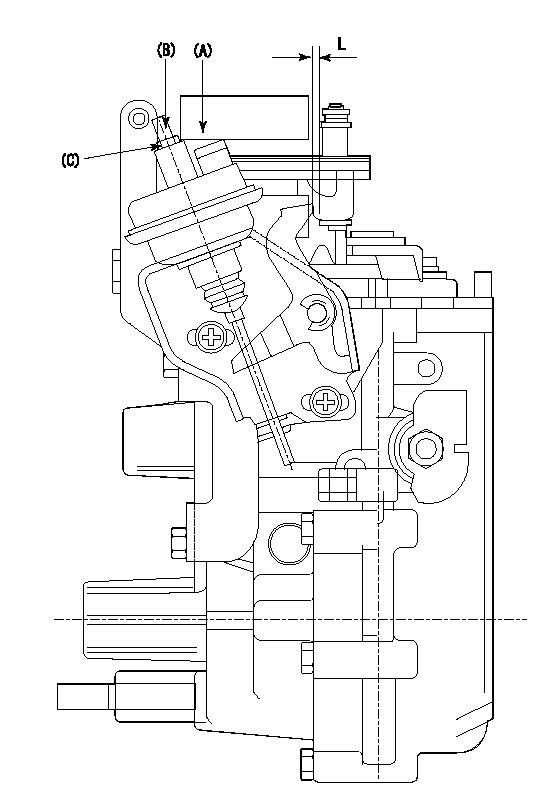
(A) applied negative pressure
(B) Screw
(c) Nut
1. Set the actuator as described below.
(1)Confirm that there is clearance between the actuator lever and the speed lever.
(2)Loosen the nut (C).
(3)Push in the screw (B).
(4)Apply P1 from the actuator (A) part.
(5)Pull out the screw (B) slowly.
(6)Tighten and fix the nut (C) when pump speed is Na and the rack position is Ra.
(7)Torque the nut (C) to T1.
(8)Apply P2 several times.
(9)Confirm that the actuator functions normally.
(10)Confirm that there is a clearance between the actuator lever and the speed lever at that time.
----------
P1=53.3kPa(400mmHg) P2=53.3kPa(400mmHg) Na=400r/min Ra=9.55+-0.1mm T1=1.2~1.6N-m(0.12~0.16kgf-m)
----------
L=(2)mm
----------
P1=53.3kPa(400mmHg) P2=53.3kPa(400mmHg) Na=400r/min Ra=9.55+-0.1mm T1=1.2~1.6N-m(0.12~0.16kgf-m)
----------
L=(2)mm
Timing setting
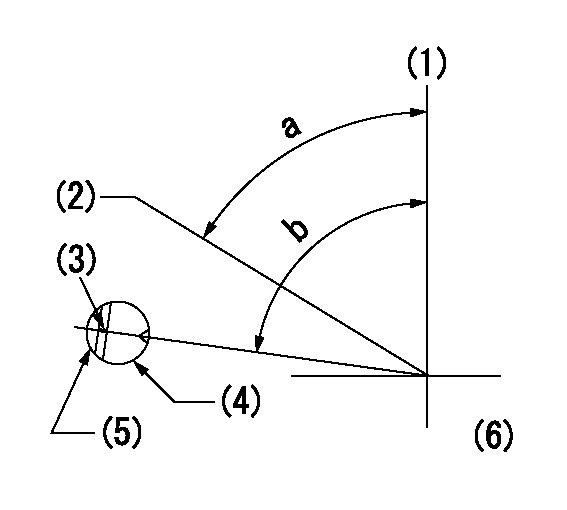
(1)Pump vertical direction
(2)Position of gear's standard threaded hole at No 1 cylinder's beginning of injection
(3)Stamping position on the A/T outer rim
(4)Pump bracket check hole position.
(5)At the No 1 cylinder's beginning of injection, align with the projection seen through the bracket's check hole and mark the A/T's bevel C1.
(6)B.T.D.C.: aa
----------
aa=11deg
----------
a=(60deg) b=(85deg)
----------
aa=11deg
----------
a=(60deg) b=(85deg)
Information:
New Indicator Lamps On Console
Illustration 28.Three lamps are now located on the right side of a cover above the dash. See Illustration 28. These lamps are used to alert the operator to various engine conditions.* Engine Fault And Diagnostic Lamp (B) - This lamp indicates the presence of any engine faults logged in the ECM. The lamp will light when an engine fault occurs and remain lighted until the problem causing the fault indication has been corrected. To assist in diagnosing problems the fault type will be displayed in a coded manner when the panel test switch is in the DOWN position. See the appropriate Service Manuals for code descriptions.* Air Cleaner Restriction Lamp (C) - When lit, this lamp indicates the air cleaners are in need of servicing. * Engine Overspeed Lamp (D) - When the engine speed exceeds 2100 rpm, this lamp will light. This will alert the operator to take steps to limit engine speed. If the engine speed continues to increase above 2300 rpm, the lamp will flash on and off. This will alert the operator to take steps to reduce engine speed. When the engine speed is reduced below 2000 rpm the lamp will turn off.EMS Panel and Diagnostic Check Switch
Illustration 29.The panel test switch (E) located on the dash below the EMS panel now has two functions. It will continue to test the EMS panel when in the UP position. When the knob is in the DOWN position it will activate the engine self-diagnostic system by lighting the check engine lamp. This is the red lamp located in the left position in the cover above the dash. When activated this lamp will flash out a system of codes which will identify any active faults. See Illustration 29.If there are no active faults the lamp will flash a code "55" by lighting five times, pausing briefly, and lighting five times again. If the light flashes other codes, refer to the troubleshooting guide.Starting Aid System
Place starting aid system switch (F) in the AUT (down) position before starting the engine. - When temperatures require ether as an aid for starting, a metered amount of ether is injected. If the engine runs rough, move the toggle switch up to the MANUAL position, and additional ether will be injected in metered doses until the engine runs smoothly.When the engine runs smoothly, return the switch to the OFF (centered) position. See Illustration 29. Place the starting aid switch in the OFF position, when using the "Crank without injection" diagnostic feature of the ECM. This will prevent ether injection into the engine during the troubleshooting procedure.Machine Checkout and Test
When the engine installation is complete, refill, and/or check the fluid levels in all compartments of the machine. Before starting the engine, visually inspect the machine for any fluid leaks, loose or missing fasteners, fittings or wires. Correct any discrepancies which may be present before cranking or starting the engine.The engine being installed has been tested. However, be prepared for an
Illustration 28.Three lamps are now located on the right side of a cover above the dash. See Illustration 28. These lamps are used to alert the operator to various engine conditions.* Engine Fault And Diagnostic Lamp (B) - This lamp indicates the presence of any engine faults logged in the ECM. The lamp will light when an engine fault occurs and remain lighted until the problem causing the fault indication has been corrected. To assist in diagnosing problems the fault type will be displayed in a coded manner when the panel test switch is in the DOWN position. See the appropriate Service Manuals for code descriptions.* Air Cleaner Restriction Lamp (C) - When lit, this lamp indicates the air cleaners are in need of servicing. * Engine Overspeed Lamp (D) - When the engine speed exceeds 2100 rpm, this lamp will light. This will alert the operator to take steps to limit engine speed. If the engine speed continues to increase above 2300 rpm, the lamp will flash on and off. This will alert the operator to take steps to reduce engine speed. When the engine speed is reduced below 2000 rpm the lamp will turn off.EMS Panel and Diagnostic Check Switch
Illustration 29.The panel test switch (E) located on the dash below the EMS panel now has two functions. It will continue to test the EMS panel when in the UP position. When the knob is in the DOWN position it will activate the engine self-diagnostic system by lighting the check engine lamp. This is the red lamp located in the left position in the cover above the dash. When activated this lamp will flash out a system of codes which will identify any active faults. See Illustration 29.If there are no active faults the lamp will flash a code "55" by lighting five times, pausing briefly, and lighting five times again. If the light flashes other codes, refer to the troubleshooting guide.Starting Aid System
Place starting aid system switch (F) in the AUT (down) position before starting the engine. - When temperatures require ether as an aid for starting, a metered amount of ether is injected. If the engine runs rough, move the toggle switch up to the MANUAL position, and additional ether will be injected in metered doses until the engine runs smoothly.When the engine runs smoothly, return the switch to the OFF (centered) position. See Illustration 29. Place the starting aid switch in the OFF position, when using the "Crank without injection" diagnostic feature of the ECM. This will prevent ether injection into the engine during the troubleshooting procedure.Machine Checkout and Test
When the engine installation is complete, refill, and/or check the fluid levels in all compartments of the machine. Before starting the engine, visually inspect the machine for any fluid leaks, loose or missing fasteners, fittings or wires. Correct any discrepancies which may be present before cranking or starting the engine.The engine being installed has been tested. However, be prepared for an
